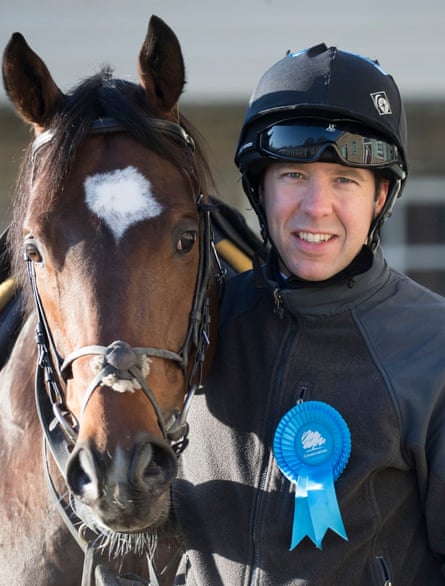It’s the middle of a third set tiebreak on Wimbledon’s Centre Court, and 15,000 tennis fans are clapping to their own beat, whipping up anticipation for a crucial line call. Hawk-Eye, the automated line system the tournament uses, the tennis equivalent of a Roman emperor’s thumb – able to overrule the traditional linespeople with their ostentatious crouching – flashes on to the big screen. The clapping reaches a climax: Jannik Sinner, a wiry, 21-year-old Italian with a somewhat incongruous blaze of red, curly hair has hit a backhand long by a few centimetres of the All England Club grass. A few minutes later, he loses the tiebreak – and I lose £800.
In the preceding two years, I have lost much, much more betting on tennis. I have lost £40,000. I didn’t see it coming, the gambling addiction. Even now, I wince a bit at the word “addiction”, though that is plainly what it is.
Quick Guide
The numbers on the UK gambling industry
Show
“I really wish there had been a warning that gambling was addictive,” I joked to a friend, though neither of us was laughing – at that point I was genuinely worried about paying rent and bills. I had lost all of my savings. I’d “spent” an entire book advance.
Along with many people, I still imagined gambling as the preserve of bored middle-aged men in rundown high-street shops; Ladbrokes and William Hills nestled among kebab joints and pawn shops. Stubby pencils, receipts littering floors, rising voices as dogs with prominent ribs raced around a track on a TV screen. Often, that’s not the way it is any more. Nowadays you can bankrupt yourself via an app on a mobile phone, or a never-closed browser tab.
How did it start? I ask myself that a lot. Usually when I’m looking at my bank balance – which I now try not to, like the squeamish studiously ignoring the nurse drawing blood. Until a couple of years ago, I had never so much as put 50p on the Grand National. I’d never bought a lottery ticket; entered a raffle; set foot in a casino. I didn’t understand odds. Gambling held zero appeal.
Then, a few things happened. The first was the pandemic. It is probably not surprising that more than a third of problem gamblers relapsed during the pandemic. Housebound, there was nothing to do. Those who were lucky enough to keep their jobs had more disposable income, and a lack of commuting meant increased free time. Those who did not keep their jobs turned to a possible avenue to raise cash quickly.

But perhaps there were two key triggers for me. First, even before the pandemic, I had been depressed for a seemingly endless, anhedonic time (I have diagnoses of bipolar disorder and ADHD).
The depression meant that I had retreated from personal interaction and spent the majority of my days alone, usually in bed. Finding it difficult to do the things I usually would. Hard to focus. Mostly unable to work, read. I had no motivation, and was frequently suicidal. Online withdrawal accompanied real life withdrawal. I stopped using Twitter, when previously I had been an avid user.
It turns out tech companies do not like it when one takes an extended break, because when I started to feel a little progress with my mental health and returned, the algorithm had buried me, which was the second trigger. I was no longer getting the hits of dopamine I was used to from engagement, talking to friends and colleagues and feeling in touch with the world.
The reward system in my brain wasn’t firing. Some smokers quit and take up knitting to keep their hands busy – I replaced scrolling Twitter notifications for checking live match scores. I replaced actual triumphs in life, big or small – being nominated for awards, or writing a piece I was proud of, or just enjoying drinks with friends on a beautiful evening – with the hit of winning.
My entire existence revolved around it.
If bookmakers were to conceive the perfect sport, it would be tennis. At almost any given moment, there is a tennis match happening. Most players take a single month off at Christmas, and that’s it. Come January, it’s the beginning of the hard-court season, and things never let up from there. There are multiple tours for men and women. For men, the highest-level tour is the main ATP tour, followed by Challenger and ITF Futures tournaments. Women compete on the WTA tour, and below that, the 125 and 125K series and ITF (International Tennis Federation) events. But in the end I was even betting on completely obscure college players.
There are never-ending markets. You can bet outright on who will win matches, or whole tournaments. But you can also bet on whether Player A will win their first service game. You can bet on what the score of that first service game will be. You can even bet, during the game, on who will win the next point. Have I bet on who will win the next point? Of course I have. You will never win £500 quicker; you will never lose £500 quicker.

I went from being someone who enjoyed and played tennis in school, but who, as an adult, barely followed the sport, to becoming obsessed. I watched every single tournament. I knew that certain tournaments use different balls for men and women. I knew which female players – mostly the flatter hitters – hate this. I knew that John Isner, who stands at almost 7ft tall, and has hit 13,947 aces in his career, will nearly always end up playing a tiebreak, because his serve is so hard to break. (Yes, you can bet on whether a match will include a tiebreak.)
I knew the personalities and characteristics of the umpires, the ones most likely to piss off the mercurial Aussie Nick Kyrgios (most of them, but especially Carlos Bernardes). That the gangly Greek, Stefanos Tsitsipas, who resembles a daddy long legs when squatting low and wide in preparation to receive a serve, has a propensity to take bathroom breaks. I learned which players are most likely to choke on the big points, and which are, conversely, particularly “clutch”.
The unique aspect of betting on sports is that you are handing agency over your finances to strangers. To weather, even. It is an extraordinarily stupid thing to do.
I was, perhaps, relying on a teenager making his tour debut, who may have been carrying an injury I didn’t know about, to not be destitute at the end of the month. Was I going all in on a talented female player who, unbeknown to me, would not be at her best because she argued with her boyfriend the night before and came on her period that morning?
Rafa Nadal, 14-time Roland Garros champion, prefers to play in the daytime on clay. The court is quicker; the ball bounces higher; the humidity is lower. But what if it rained, and his match was rescheduled to the evening session?
I’d wager (obviously) that much of the abuse sports stars suffer online is because, someone, somewhere, has bet on them doing something they haven’t ended up doing. The mind of an addict becomes unreasonable, irrational.
Because all gamblers have a feeling. They will win all of their money back this time. At first you have to win £1,000 back. Then you have to win back £5,000. And on and on it goes, like a 20-stroke rally which ends each time with the ball slamming into the net.
But then, you do win some of it back! You win thousands, and you think: great, I will use these winnings as a platform to win the rest back. Then Iga Swiatek, world No 1, who has won a record breaking 37 matches in a row, will inexplicably lose. Or, frequently, every leg, bar one, of your accumulator – a bet requiring multiple results to come in – will win. Gamblers live in a permanent state of if only and what if. What if I hadn’t cashed out then; what if I had? What if I’d trusted my gut instinct on that one? What if I hadn’t?
I tried to quit many times. I would utilise “self-excluding” options. I used, and eventually blocked myself from, 16 different online bookies. When I blocked myself from the bigger sites, I would then use even dodgier outfits: less attractive odds, glitchy websites, opaque terms and conditions.
At one point, in true addict style, I roped family into it. I ended up lying to my mother and sister to borrow their bank cards to set up new accounts. (I transferred money to them, so I was still gambling with my own money and not theirs, which was at least something.) I had multiple identities on multiple websites. I was three different people.
Unfortunately, all of them were losing.
Peter Coates was born in Stoke-on-Trent in 1938. The son of a miner, and the youngest of 14 children, his mother died when he was two. He left school to work in a branch of the chain restaurant Wimpy’s and, using the knowledge he acquired, set up a small business catering to football clubs. Nothing fancy: scran in polystyrene clamshells served through hatches. But it kicked off his career as an entrepreneur and he went on to establish a chain of bricks-and-mortar betting shops called Provincial Racing.
Provincial Racing’s virtual offspring, Bet365 started life in 2000, out of a portable building in a car park. Coates’s daughter, Denise, then 22, took the reins. Though her big idea to move betting online coincided with the dotcom bubble bursting, her foresight – including developing in-house software and in-play options – paid off big time. Today, Bet365 has an annual revenue of £2.8bn. It has 80 million customers worldwide, and operates in 200 countries, 17 languages, and 29 currencies.
Denise, who is the company’s co-CEO and majority stakeholder, paid herself £469m in salary and dividends in 2020 – or £53,500 per hour. Last year, she employed Foster and Partners – better known for building airports, opera houses, the Millennium Bridge and the reconstruction of Wembley stadium – to design a £90m glass-fronted house with artificial lake and sunken tennis courts on 52 acres of land.

The company is, for the most part, still based in Stoke (though there are also headquarters in the tax havens Gibraltar and Malta, common for betting outfits). Denise’s brother, John, acts as co-CEO. And Peter, the patriarch, is now joint chairman of his beloved local football club, Stoke City (who play in the Bet365 Stadium).
Former Stoke-on-Trent MP Tristram Hunt once said that the Potteries area took “immense pride” in the Coates family. Denise is the country’s biggest taxpayer. You might say that Bet365 represents a fantastic British success story. Except, of course, that its success requires other people to fail. Gains that are dependent on other people’s losses. Ninety-million pound houses built in part on evictions.
Beyond this not inconsequential quibble with the entire raison d’etre of bookmakers, Bet365 has been involved in multiple controversies. A 2014 investigation by the Guardian found that it was changing its domain names to sidestep Chinese regulators, leading to the arrest of some customers. In 2016, the company was fined $2.7m in Australia after a judge ruled its marketing misleading.
Bet365 is not an outlier. BetVictor, which operates in 150 countries and has its headquarters in Gibraltar, was fined £2m in February after the UK Gambling Commission found it failed when it came to “equitability, social responsibility and anti-money laundering measures”.
Genesis Global, owner of multiple casino sites, was earlier this year fined £3.8m, also for breaches of social responsibility and money-laundering checks. In one example, a customer was allowed to deposit £1.3m before any “source of fund” checks were carried out.
In March, another online casino, 888, was fined £9.4m by the commission for, among other things, setting a £1,300 per month deposit limit for an NHS employee whose known monthly income was £1,400.
In 2020, Betway was fined a record £11.6m, partly for allowing millions of stolen money to wash through the business. In September the company was fined more than £400,000 for advertising on webpages aimed at children.
These companies all cater to the staggering appetite for gambling in the UK. One of the largest gambling markets in the world, it generated a profit, before tax and operating deductions, of £12.7bn in the 2020-2021 financial year. A March 2022 survey of 15,000 people (by the UKGC) found that a massive 43% of respondents had gambled in some form in the past four weeks.
According to the UK Health Security Agency 2.2 million people in England either have a form of gambling addiction, or are at risk of one. In 2021, there were more than 400 gambling-related suicides in the UK (where gambling addiction was noted as a contributing factor at inquest). The charity Gambling With Lives, established by the parents of Jack Ritchie, who was 24 when he died, documents just some of them on its website.
Twenty-three-year-old Joshua Jones, a talented musician who played in the Wiltshire Youth Jazz Orchestra, gambled his first term university grant and sold his possessions as things spiralled, and he ended up sleeping on a friend’s sofa. Paul Wills, 48, a popular police sergeant, whose wife, Hana, had no idea that her husband had been sucked into gambling.
Kimberly Wadsworth, 32, worked in marketing. She had told her family about what was happening – they even helped her book a hypnotherapy session – but she took her own life in 2018. Gambling companies had made her a “VIP” customer; a status that confers special offers and promotions for people spending (ie losing) a lot of money, and sometimes gives partial rebates on losses to encourage them to keep going.
I remember one friend, when my losses were at £15k, said: “Well, the good thing is, it could be worse.” At the time I thought: How could this possibly be worse? Then I lost another 25 grand, spent another six months in total despair, so she was right. But I haven’t become homeless, or had a marriage fall apart. I’m still alive.
It will probably not come as a surprise that, though anyone can fall into problem gambling, people with existing mental health issues are particularly susceptible.
When it comes to my own diagnoses, multiple studies have established links between them and gambling. According to a Cambridge University study, one in 10 people with bipolar disorder develop “moderate to severe problems” with gambling. Interestingly, while in the general population men make up the majority of problem gamblers, in bipolar patients there is no gender differential.
One study of people addicted to gambling who had sought treatment at a clinic in Melbourne reported that almost 30% screened positively for ADHD (compared with a 14% rate in a community sample), and there was a positive correlation between the severity of an individual’s ADHD and the severity of their addiction. This rather throws into relief a recent tendency for people to self-diagnosis ADHD on the basis that they, say, once lost their keys.
Incidence of problem gambling is also higher for those with other mental illnesses and addictions. Vulnerable and underprivileged people are lucrative customers across the board – and targeted. Those with the largest losses, both online and in-person, are concentrated in the most deprived areas. The east London borough of Newham, one of the poorest areas in the country, has more than 80 betting shops. At one point, there were 18 in a single street.
This is a practice known as “clustering” – a way of getting around a rule that limits each shop to four fixed-odds betting terminals (FOBTs), modern touch screen slot-machines, which, alongside the flashing lights, musical jingles and tumbling coins of traditional arcade units, offer rapid financial ruin.
Clustering as an unethical workaround is not out of character for bookmakers. If the house always wins, that’s partly because the house is haunted. When customers are on winning streaks, bookmakers will engage in “gubbing”, a term for restricting the activity of bettors. This happened to me many times. If I was consistently winning, I would have my bets restricted, or be limited to pennies per stake. But if I was losing hundreds – even thousands – of pounds in days, I could bet however much I liked. Bookies are never not moving the goalposts.
With sports betting, there’s that other hazard: fixing. Tennis is ripe for fixing. The million-dollar endorsement deals of top athletes belie just how poorly paid lower ranked players are. Most struggle to break even. A first-round win in a Futures tournament will earn a player around $150. Factor in travel, accommodation, and equipment costs – and a salary paid to a coach – and professional tennis is far from a remunerative career.
About a year into my gambling hell, I discovered that a player who I frequently bet on, Nicolas Kicker, had been suspended from professional tennis for throwing matches and only recently rejoined the tour. At the time of his offences, Kicker was in significant debt, worrying about how to support his young son. He bought secondhand rackets, which he strung himself.
So when Kicker was approached and offered $15,000 to lose a match in three sets, he took it. The problem was that Kicker’s underpar performance was so obvious that it blew up on social media. In footage of the match available on YouTube, Kicker hits feeble serves and swipes aimless returns like a cat failing to catch a fly. He is almost visibly annoyed whenever he wins a point. Almost £700,000 had been traded on the match on Betfair alone. It was just hours before an investigation was opened.

After years of criticism for little action on corruption in the game, a toothless body named the Tennis Investigation Unit was replaced with the independent International Tennis Integrity Agency headed, among others, Dee Bain, the former veteran Metropolitan detective who had ensnared Kicker. Barely a month now passes without fines and suspensions meted out, underscoring just how insidious the practice is.
Tournament organisers are also becoming wise to “courtsiders”, members of crime rings who sit in stadiums and relay real-time information to bettors, via encrypted apps such as Telegram, in attempts to beat online and television score updates. They have even been known to evade security with fake beards and wigs. The integrity agency has a big task on its hands. Not only does the ITF sell its own in-play data to bookies, but fixing is fully fledged organised crime. Mafia-linked rings, spread across Europe and Asia, move around millions of pounds. What if that player I bet on isn’t underperforming because she came on her period after all, but because she’s been paid off by a Russian syndicate?
The future of the gambling industry is, depending on which side of the net margins you fall, bleak or booming. The Coates family certainly has much to be optimistic about. In the UK, a white paper with a view to reforming gambling laws – the culmination of a two-year review – was this summer delayed for the fourth time. Pro-reform Conservative MP Iain Duncan Smith expressed disappointment, and Labour’s Carolyn Hughes, chair of a cross-party parliamentary group examining gambling harm, was clear that this further delay would “cost lives”.
Gambling is the number one industry offering gifts and hospitality to parliamentarians. In 2021, MPs accepted £225,000 in wages and gifts from gambling companies. One of the first sports to return to action during the pandemic was horse racing – a passion of then-health secretary Matt Hancock, and the recipient of thousands of pounds in donations from wealthy racehorse owners and trainers and whose constituency contains the Newmarket course.
Bet365’s Peter Coates is one of the largest donors to the Labour party, giving hundreds of thousands of pounds. In the mid-00s, he and other industry leaders made hefty donations in the wake of New Labour’s sweeping and disastrous deregulation of gambling – something a number of party grandees, including Harriet Harman, have since admitted was a mistake. Which it was, but is also a bit like Mercutio describing his fatal wound as a scratch.
Globally, bookmakers continue to win. In the US, the supreme court in 2018 overturned a federal ban on sports betting that had been in place since 1992. Since the ban was overturned, Americans have bet $125bn on matches. Bet365 continues its expansion into Latin America; Albania has legalised sports betting this year; the Netherlands, which legalised online gambling in 2021, now reports that punters spend €81m per month.
There is, however, increasing pushback from grassroots sports fans. This autumn, a fan-led group walked the breadth of the country to lobby clubs to cut ties with gambling companies. More than 20,000 Everton fans signed a petition objecting to their club signing a £10m shirt sponsorship deal with Stake.com, and Bournemouth supporters followed suit (neither was successful). While half of clubs in the Premier League are sponsored by betting companies, a third of fans are less likely to buy replica shirts if they carry their logos. League One club Bolton Wanderers has responded to fan pressure and cut ties with all gambling firms.
In recent years, the UK has seen some progress in gambling regulation. Former sports minister Tracey Crouch worked tirelessly to bring in legislation to limit the maximum stakes permitted on FOBTs, despite being fought all the way by the Department for Culture, Media and Sport. She even, according to the archbishop of Canterbury, had God on her side. But the extremely slow progress – and an increasingly libertarian Conservative government – do not inspire confidence.
Sometimes, I wonder whether Denise Coates lies awake at night, in her glass-walled bedroom, and feels guilty. Or whether she thinks her chosen line of business is as ethical as any other in the leisure or entertainment sector; that it isn’t her fault that some individuals have no self-restraint.
Millions of people, after all, enjoy a harmless night out at a casino, or pick up a lottery ticket with their groceries. But just 5% of customers are responsible for 70% of betting companies’ revenue, and they are very much not the ones in colourful hats waving their winning tickets at Ascot on a day out with their friends. They are me, desperate and deluded, entirely numb to the outside world, watching their entire life fall apart.

I was contacted, eventually, by the “safer gambling teams” of some betting outlets – not all. I lied to them about my income and savings, and how much I could afford to lose. One time I said I had inherited a windfall. Another time I said I earned £30k more than I do. They didn’t check, but if they had, I’m not sure I wouldn’t have been furious rather than grateful.
Because the problem with sicknesses of the mind is their immanent ruthlessness. The person with deep-rooted trauma in desperate need of effective therapy might defensively try to undermine their therapist. The patient with life-destroying insomnia will sleep through their appointments at the sleep clinic. Addicts will lie, and lie, and lie again.
Nevertheless, these companies should have checked. A gambler’s word is not worth the betting slip it’s written on. Bookmakers cannot be allowed to continue operating in profitable disingenuousness, encouraging people with clear problems to carry on; to lose everything and then, finally, their lives.
I’ve written here mostly in the past tense. But the truth is I decided to write this piece because I am still gambling, and I considered that this might be the one thing that could stop me. Because, though I currently have the very real and justified worries that I will lose my job, friends and home, I also have, as I type this, one eye on my phone checking for results.
At the time of writing, the US Open, the most unpredictable of the slams, is about to begin. The sweltering, late-summer sun will see sweat dripping from the peaks of players’ caps, ballboys and girls running with towels to mop it from the court. I tell myself that after this tournament I must stop. That I will retire along with Serena Williams, whether or not I win everything back (I have a feeling). In the meantime: there’s a ball to be struck, a line call to be made, a fist to be pumped – and I hold my breath.




